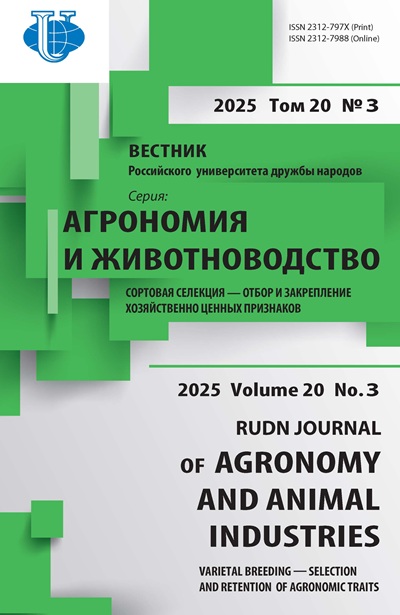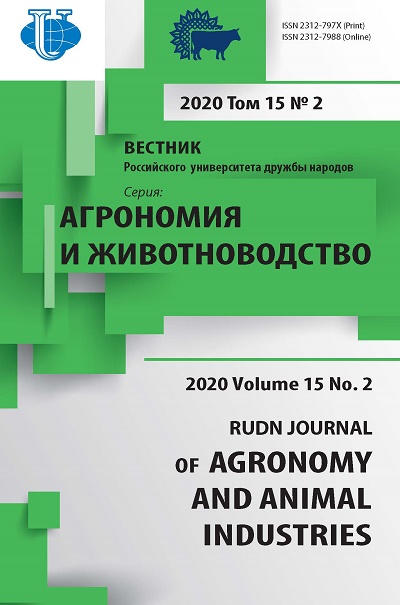Efficiency of complex protective measures in cultivating perennial grasses in radioactively contaminated floodplain meadows
- Authors: Bokaturo N.N.1, Spravtsev A.A.1, Astashina A.A.1, Potsepai S.N.1, Shapovalov V.F.1
-
Affiliations:
- Bryansk State Agrarian University
- Issue: Vol 15, No 2 (2020)
- Pages: 159-172
- Section: Soil science and agrochemistry
- URL: https://agrojournal.rudn.ru/agronomy/article/view/19564
- DOI: https://doi.org/10.22363/2312-797X-2020-15-2-159-172
- ID: 19564
Cite item
Full Text
Abstract
In a stationary, factorial experiment established in 1994 on radioactively contaminated natural floodplain fodder lands, the effect of cultural practices in combination with agrochemical measures was studied in order to produce organic feed (hay) which complies with the applicable standards of VP 13.5.13/06-01 in terms of specific activity of cesium in them - 137. The translocation sizes of 137Сs in the soil-plant system were determined by a complex of agrotechnical and agrochemical measures. The highest effectiveness of protective counter-measures in the framework of the research was obtained with amelioration of the flood meadow. Transition of cesium-137 from the soil into the feed, and from the feed into the livestock products (milk, meat) was calculated. Application of full mineral fertilizer with a N:K ratio of 1:1.5 both against surface and root treatment reduces the 137Cs transition into livestock production, that accordingly reduces the risk of a high internal irradiation dose to people consuming these products to the levels conforming radiation safety standards.
About the authors
Nikolay N. Bokaturo
Bryansk State Agrarian University
Author for correspondence.
Email: bgsha@bgsha.com
Postgraduate Student, Department of Agrochemistry
Bryansk, Russian FederationAleksandr A. Spravtsev
Bryansk State Agrarian University
Email: bgsha@bgsha.com
Postgraduate Student, Department of Agrochemistry
Bryansk, Russian FederationAlina A. Astashina
Bryansk State Agrarian University
Email: bgsha@bgsha.com
Postgraduate Student, Department of Agrochemistry
Bryansk, Russian FederationSvetlana N. Potsepai
Bryansk State Agrarian University
Email: snpotsepai@yandex.ru
Postgraduate Student, Department of Agrochemistry
Bryansk, Russian FederationViktor F. Shapovalov
Bryansk State Agrarian University
Email: bgsha@bgsha.com
Doctor of Agricultural Sciences, Professor, Department of Agrochemistry, Soil Science and Ecology
Bryansk, Russian FederationReferences
- Kosolapov VM, Trofi ov IA. Problems and prospects of forage production development. Fodder production. 2011; (2):4—7. (In Russ.)
- Kutuzova AA, Privalova KN. Priority lines of development of meadow-pasture fodder production. Vestnik of the Russian agricultural science. 2012; (2):56—58. (In Russ.)
- let Chernobyl’skoi katastrofy: vzglyad v budushchee: natsional’nyi doklad Ukrainy [20 years of the Chernobyl disaster: a look into the future: national report of the Ukraine]. Kiev: Atika publ.; 2006. (In Russ.)
- Avariya na Chernobyl’skoi AES i ee posledstviya: Informatsiya GK AE SSSR, podgotovlennaya dlya soveshchaniya v MAGATE [Accident at the Chernobyl nuclear power plant and its consequences: Information from the GK AE of the USSR prepared for the meeting at the IAEA. 1986. (In Russ.)
- Sanzharova NI, Panov AV, Isamov NN, Prudnikov PV. Protective and rehabilitation countermeasures in agriculture: to the 30th anniversary of the Chernobyl NPP accident. Agrochemical herald. 2016; (2):5—9. (In Russ.)
- Belous NM. Socio-economic Development of the Regions of the Bryansk region affected by the Chernobyl disaster. Vestnik of the Bryansk State Agricultural Academy. 2013; (4):41—48. (In Russ.)
- Panov AV, Fesenko SV, Aleksakhin RM. Effectiveness of measures aimed at reducing radiation doses to residents of rural settlements in the remote period after the accident at the Chernobyl nuclear power plant. Radiation Biology. Radioecology. 2001; 41(6):682—694. (In Russ.)
- Averin BC, Podolyak AG. The Role of Protective Measures to Reduce Radiation Doses to the Population and Obtain Normatively Clean Agricultural Products. Belorusskoe selskoe hosiaystvo. 2010; (4):18—22. (In Russ.)
- Shapovalov VF, Plyushchikov VG, Belous NM, Kurganov AA. Development of a set of measures to radically improve the natural root land contaminated by radionuclide cesium-137. RUDN Journal of Agronomy and Animal Industries. 2014; (1):13—20. (In Russ.) doi: 10.22363/2312–797X-2014–1–13–20
- Panferov N.V. Efficiency of long-term application of mineral fertilizers in floodplain pastures. Fodder production. 2008; (3):9—12. (In Russ.)
- Anishina YA. Elemental composition of the feed of single-species crops of perennial grasses at different levels of mineral nutrition. Vestnik of Bryansk state agricultural academy. 2011; (5):20—24. (In Russ.)
- Podolyak AG, Timofeev SF, Persikova TF. Cesium-137 and strontium-90 transfer to grass stands on peat-bog soils of lowland meadows. Agrohimia. 2004; (11):63—70. (In Russ.)
- Chesalin SF. Influence of integrated application of agrotechnical and agrochemical measures on the quality indicators of hay of perennial grasses. Vestnik of Bryansk state agricultural academy. 2013; (4):10—17. (In Russ.)
- Potsepai SN, Spravtsev AA, Kharkevich LP, Belchenko SA, Shapovalov VF. Methods of surface and radical improvement of forage lands under radiation contamination. Agrochemical Herald. 2019; (4):58—62. (In Russ.) doi: 10.24411/0235–2516–2019–10061
- Smolski VE, Kharkevich LP, Chesalin SF, Bozhin IA, Bokaturo NN. Effectiveness of measures to improve productivity of hayfields. Agrochemical Herald. 2015; (5):25—28. (In Russ.)
- Metodicheskie ukazaniya po provedeniyu issledovanii v dlitel’nykh opytakh s udobreniyami. Chast’ 1 [Methodological Guidelines for Research in Long-term Experiments with Fertilizers. Part 1]. Moscow: VIUA publ.; 1975. (In Russ.)
- Metodicheskie ukazaniya po opredeleniyu estestvennykh radionuklidov v pochvakh i rasteniyakh [Guidelines for the Determination of Natural Radionuclides in Soils and Plants]. Moscow: TsINAO publ.; 1985. (In Russ.)
- Fokin AD, Lurie AA, Troshin SP. Sel’skokhozyaistvennaya radiologiya [Agricultural Radiology]. St. Petersburg: Lan’ publ.; 2011. (In Russ.)
- Thompson S. Why plants don’t die from cancer? The conversation UK. 21 June 2019. Available from: https://theconversation.com/why-plants-dont-die-from-cancer-119184.
- Georgieva M., Rashydov N.M., Hajduch M. DNA damage, repair monitoring and epigenetic DNA methylation changes in seedlings of Chernobyl soybeans. DNA Repair. 2017; 50:14—21. doi: 10.1016/j. dnarep.2016.12.002
Supplementary files















